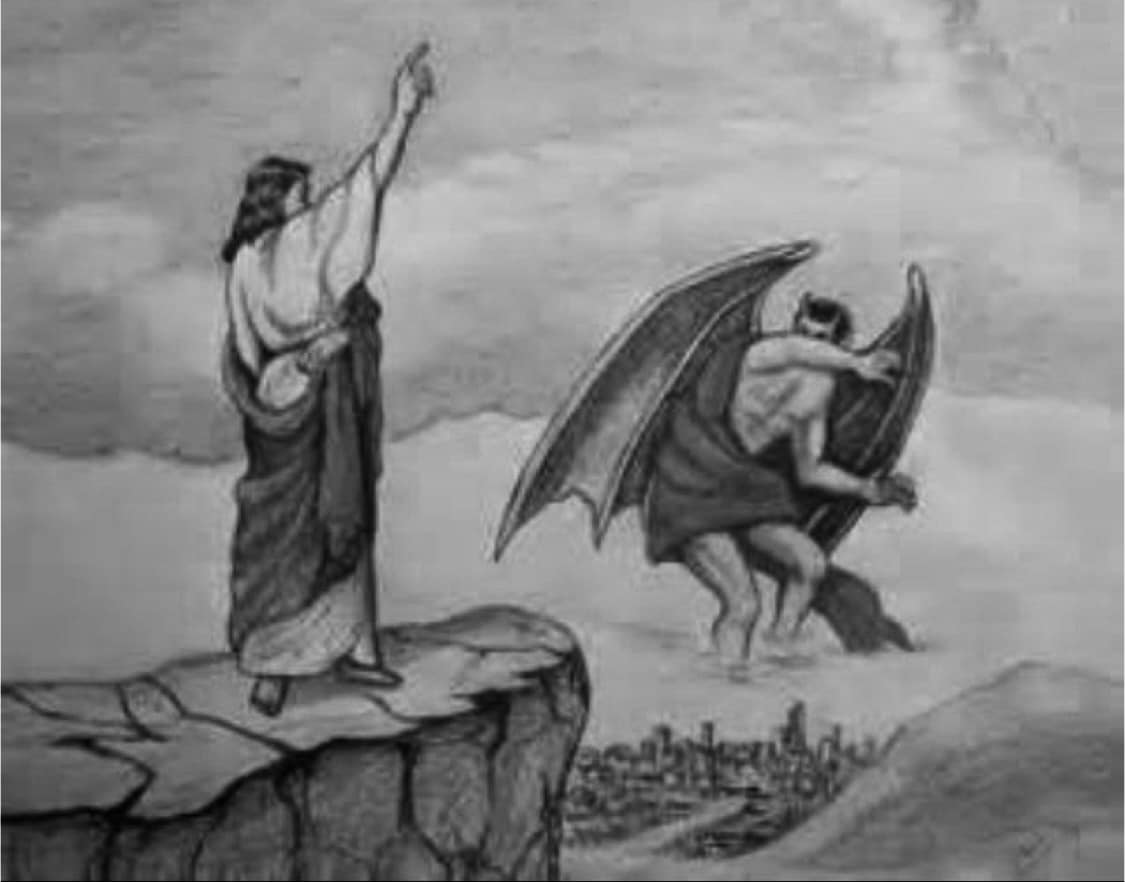394 total views

During the time of Jesus, the Mediterranean world lives by a deeply rooted belief in the spirits who exist in great numbers and said to be in constant capricious interference in the daily human life. At Jesus baptism, when the voice identified him as “my son in whom I am well pleased”, (Mt 3:13-17), it is as if of all the spirits heard this and so as expected went out after Jesus to test him if it is indeed true and if true will try to make him do something displeasing.
All the Synoptic Gospels (Matthew, Mark and Luke) have accounts of Jesus’ temptation although only Matthew and Luke give any details, (Mt 4:1-11; Lk 4:1-13; Mk 1:12-13). The verb peirazō (πειράζω) means primarily “to tempt” or “put to the test”. The story given by Mathew in today’s gospel, (4:1-11, cf Mk 1:12-13, s1S#19 for a different theological nuance), presented Jesus engaging on a direct one-on-one dialogue with this evil spirit in a scripture-quoting contest- three times replying with a quote from the book of Deuteronomy (8:3, 6:16, 6:13), to resist the temptations. The devil quotes the Scripture as well (Ps 91:11-12) but did not succeed in tripping him up, leaving Jesus while the angels came to minister to him.
The story is considered to be based upon the pattern of Israel’s temptations in the desert during it’s Exodus from Egypt. Matthew arranged it differently from Luke to end with the high mountain as a scene of the final temptation. Mountains are important symbols in Matthew, as places of revelation, where the Father of the Son gives teaching to human beings. Clearly the story of Jesus’ victory present him as the faithful and obedient Son of God, just as he was revealed in the baptism story (3:13-17). The implied contrast of the obedient son, Jesus, with the disobedient son, Israel in the Exodus story, is deliberate.
Jesus is the model of obedience to God. He emerges victorious from his combat. Until his arrest, trial, and death, no one, human or spirit succeeds in tripping him up or causing him to fall from his stated position and goals. This is the consequence of unflinching obedience to God. The devil will always be in constant interference in our daily human life. But it would be too lame to make “the devil made me do it!” our favorite excuse, for Jesus himself who was ‘tested through what he suffered…in every way, yet without sin’, (Heb 2:18; 4:15), so are we; but surely He will help us, having been tested himself. “Lord, lead us not into temptation but deliver us from evil”. Amen.
s1S#19 Tempt 2/21/21
What could be considered the first occurrence in the Bible of the word related to ‘tempting’ is found in the famous story of Abraham being asked by the Lord to sacrifice his son Isaac, (Gen 22:1-19). The word used is nāsāh (נִסָּ֖ה) where the Lord is putting the patriarch’s faith to a severe test. Thus, in this context, the underlying sense of testing the quality or legitimacy of, or to ascertain the validity or integrity of, one’s faith in God.
The people of Israel was similarly tested in the wilderness in relation to their faith in him, (cf. Ex 15:25; Ps 95:8). Where human beings instigate ‘tempting’ it is seen as a sinful, culpable action with God as its object, challenging his power and authority, (cf. Ex 17:2,7; Num 14:22; Ps 78:18,41,56).
In the NT all the Synoptic Gospels (Matthew, Mark and Luke) have accounts of Jesus’ temptation although only Matthew and Luke give any details, (Mt 4:1-11; Lk 4:1-13; Mk 1:12-13). The verb peirazō (πειράζω) means primarily “to tempt” or “put to the test”. In this particular context the temptation takes place immediately after Jesus’ baptism, which is interpreted as his commissioning for the messianic mission, a ministry to be characterized by servanthood: “For the Son of Man did not come to be served but to serve and to give his life as a ransom for many”, (Mk 10:45). Thus the temptation is not for Jesus to prove his divine sonship (for such sonship is never questioned in the NT), but rather the “testing” is implicitly presented as Jesus’ struggle over whether to obey God’s call to be a servant-messiah or to interpret messiahship in the traditional terms of power, strength and conquest, the struggle detected through the Gospel accounts of Jesus’ ministry, where it is made clear that the disciples never really understood Jesus’ commitment to a servant ministry. The Pharisees are frequently described as ‘tempting’ Christ in order to ensnare him so as to bring accusation against him, (cf Mt 16:1; Mk 8:11; Lk 11:16; John 8:16).
If Jesus himself is ‘tested (through what he suffered…in every way, yet without sin’, cf. Heb 2:18; 4:15) so are we; but He will help us, having been tested himself. And through it all we can demonstrate our commitment to God and his ways, enhance our faith and our character strengthened (cf. Rom 5:3-5). Let us always remember that he promised to keep us from being ‘tempted or tested’ beyond our capacity to cope, (cf. 1 Cor 10:13).















